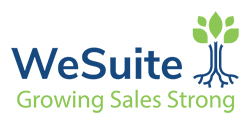Four Ways Your Sales Process Defines Company Growth & Profitability

By WeSuite
Updated 9:27 AM CDT, Mon July 11, 2022

Native content:
 In business, we talk A LOT about results; they’re how we measure success. KPIs measure performance against a wide range of metrics, and employees are rewarded based on the outcomes.
In business, we talk A LOT about results; they’re how we measure success. KPIs measure performance against a wide range of metrics, and employees are rewarded based on the outcomes.
Results are important, but if you want to grow your company, you also need to focus on repeatable workflow and processes. Your company might have a record-breaking year for sales, but how do you do it again and again? Conversely, if KPIs aren’t hitting the mark, how do you identify what to change?
Sales management software forces companies to define and improve their sales workflow and processes, resulting in greater efficiencies, accuracy, and growth not only in sales but throughout the organization.
Four ways sales software enables growth and profitability:
• Defined Sales Workflow: Salespeople don’t want to spin their wheels each time they tackle a new lead or estimate. When a sales process is not in place, companies hit a wall where inefficiencies, manual procedures, and mistakes prohibit growth and profitability. Everyone is doing “their own thing”.
When Sales is supported by tools and resources to move from step A to B to C with more accuracy, efficiency, and a repeatable process, organizational gaps are closed and selling time is given back to salespeople. Technology driven processes balance management’s need for control and implementation of best-practices with the sales team’s desire to approach their jobs with creativity and independence. Sales can sell the right products and services at the right pricing.
• Centralizing Data Removes Silos: Think of your sales organization like a football team. What if, before each down, the team broke into three different huddles and decided, separately from each other, how to execute the play? You think there would be many touchdowns? Everyone on your sales team needs to be in the same huddle, utilizing centralized, accurate data, and executing winning “plays” together. Sales management software gives your team that continuity needed for executing consistent, repeatable, effective processes the first time, every time.
• Eliminating Bottlenecks: Certain processes seem ideal in theory but are filled with manual bottlenecks when put to the test. For example, estimate reviews and approvals prevent incorrect quotes from going out the door. However, when every quote must wait for manual review and sign-off, a log jam is inevitable. Some may go out without review and others lost to more efficient competitors who deliver their quote first.
Sales management software solves this problem. Only quotes that exceed pre-established thresholds must be reviewed. Managers are notified automatically of required approvals, and with fewer in the queue, reviews happen more quickly, are focused on the highest risk sales, and include an automated audit trail. This is just one great example of how workflow automation helps processes deliver their intended results.
• Picking Up the Pace: Centralized data and automated workflows move projects along, helping to estimate and close faster, and more often. Automated generation of customized proposals and contracts turns a tedious task into a routine process accomplished in minutes, while professionally representing your brand consistently. Integration with electronic signing software, like DocuSign or eOriginal, allows customers to sign on the spot, or via email. Software can also pick up the pace by offering turnkey financing options for customers, with immediate approval during the sales process. When processes flow quickly and seamlessly, always moving the customer one step closer to a purchase, profitability and organizational growth soar.
Is your sales process driving success or holding you back? If it’s working “well enough” then that’s not good enough! Sales management software makes sales workflow the hero of your organization, driving growth, profitability, and delivery excellence.
Comments